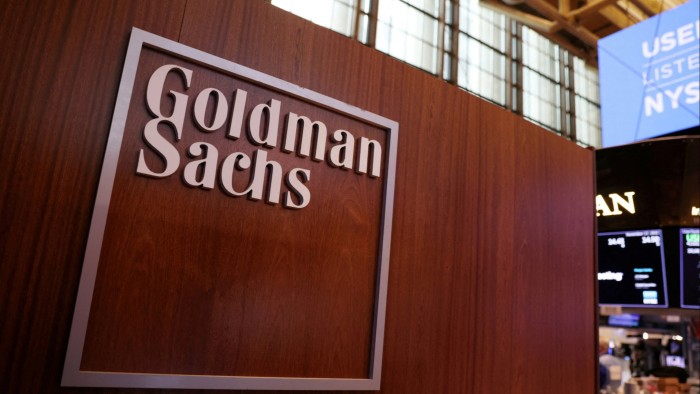Goldman Sachs may have overestimated demand for its exchange traded fund platform and been hindered by its relatively high-cost base, industry figures believe.
The bank has said it is assessing options for its ETF Accelerator, with a potential sale believed to be one possibility.
Goldman’s Accelerator launched in November 2022 and secured its first client in October 2023. It currently hosts 10 ETFs with combined assets of $4.1bn, including four funds operated by GMO and three by Brandes.
The ETF Accelerator is similar to “white-label” platforms designed to facilitate the launch of third-party funds. These platforms have proved popular in the US and made some headway in Europe, although Goldman insists it is instead a service provider. “The ETF Accelerator is not a white-label provider,” Nick Carcaterra, a spokesman for the bank, said in a statement.
In general, however, both white-label providers and Goldman’s Accelerator allow smaller fund managers and new entrants to launch ETFs more quickly and cheaply than they could otherwise do, with white labellers often providing services such as distribution, marketing, capital market support, custody, compliance, seed funding and administration.
Goldman was the first big-name financial institution to enter this market, which is dominated by the likes of Tidal Group, Alpha Architect and Exchange Traded Concepts in the US and HANetf in Europe, although Citi is due to launch a service in the first quarter of 2025.
With the ETF market growing at a rapid clip — net inflows have hit a record $1.7tn, helping push assets up by 30 per cent to $15tn, according to data from research group ETFGI — the backdrop should be propitious for those servicing it.
Tidal, for instance, has added more than 60 ETFs to its platform this year — about 10 per cent of new launches in the US — taking it to 180 funds with assets of $28bn. HANetf, the biggest player in the less developed European white-label market, has seen its assets surge 65 per cent to $5bn this year.
Yet Goldman appears to be having second thoughts.
“We are assessing what the best long-term option is for the ETF Accelerator platform for Goldman Sachs and our clients. No decision has been made and there are no imminent plans for a change,” Carcaterra said.
“What I’m hearing is that they are likely to sell. They have spent a lot of money, they have hardly any clients. I never understood what the margins are in this business for them,” said one industry figure, who wished to remain anonymous.
His understanding was that Goldman had hired more people, typically on higher salaries, compared to white-label providers, and the maths simply did not work for them, given the low fees and margins prevalent in much of the ETF industry.
A second industry source, who also requested anonymity, believed Goldman got “the business model wrong”.
Whereas US white labellers are “fiduciary asset management platforms”, he described Goldman’s connection to its clients as more akin to a “consultant”.
“They were really trying to build a tech platform that could help people launch, and it leaves a lot of the fiduciary responsibility with the client. I don’t think this has the same traction,” he said.
Goldman declined to be interviewed, but when asked to comment on the opinions expressed by those interviewed for this article, Carcaterra said in a second statement: “We don’t pay much attention to the views of anonymous individuals who don’t know our business and neither should the readers of the FT.”
Bryan Armour, director of passive strategies research, North America at Morningstar, thought that the odds may have been stacked against Goldman in the first place, given the strength of the incumbent white-label providers.
“I think in some ways Goldman may have overestimated the client demand for the Accelerator,” he said, while fears over reputational risk may have caused them to steer clear from some of the riskier ETFs that are starting to see the light of day.
“It just never really took off,” Armour added. “Goldman has always had its foot half-in on ETFs. We haven’t seen the same commitment to ETFs as we have seen from other big banks.”
The Accelerator is separate from Goldman Sachs Asset Management’s ETF arm, which operates 39 ETFs globally with combined assets of $40bn.
“Growing our ETF business in asset and wealth management is a priority for the firm. We believe the use of active ETFs will continue to grow and have been focused on scaling our ETF franchise,” Carcaterra’s statement said.
Opinions were divided as to whether Goldman would be likely to find a buyer, assuming it does decide to pull the plug.
“Goldman Sachs has a strong institutional presence and lots of resources for asset managers that are seeking to enter the ETF world. I would have thought there would be interest out there,” said Todd Rosenbluth, head of research at consultancy TMX VettaFi.
Yet Rosenbluth suggested the valuation of any sale might not be high. “I’m not sure that a business that is leveraging Goldman’s expertise is more successful outside of the Goldman umbrella than inside the Goldman umbrella,” he added.
Armour believed there would be a limited pool of potential buyers.
“Who would buy it?” he asked. “I don’t know if any white-label provider can find any synergies with their existing programme.”
If it were not a white-label provider “it would have to be someone who is looking to get into the white-label game who is currently not”, with Citi potentially “making sense”, Armour added.
However, its value without Goldman’s brand and contacts remains questionable, according to one of the anonymous industry figures: “I don’t see anything worth buying. If the clients want to leave they can just leave. If there was an asset it would have to be the technology.”
Read the full article here

